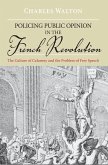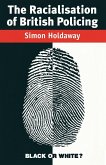Laurence Armand French
History of Policing America
From Militias and Military to the Law Enforcement of Today
Laurence Armand French
History of Policing America
From Militias and Military to the Law Enforcement of Today
- Gebundenes Buch
- Merkliste
- Auf die Merkliste
- Bewerten Bewerten
- Teilen
- Produkt teilen
- Produkterinnerung
- Produkterinnerung
The History of Policing America traces how and why law enforcement agencies evolved and became permanent agencies; looking logically through history and offering potential steps forward that could make a difference without triggering unconstructive backlash.
Andere Kunden interessierten sich auch für
![Policing the City Policing the City]() Roger LanePolicing the City60,00 €
Roger LanePolicing the City60,00 €![A History of the Dublin Metropolitan Police and its Colonial Legacy A History of the Dublin Metropolitan Police and its Colonial Legacy]() Anastasia DukovaA History of the Dublin Metropolitan Police and its Colonial Legacy49,99 €
Anastasia DukovaA History of the Dublin Metropolitan Police and its Colonial Legacy49,99 €![Literacy in America Literacy in America]() Lawrence R. SamuelLiteracy in America36,99 €
Lawrence R. SamuelLiteracy in America36,99 €![Building Communism and Policing Deviance in the Soviet Union Building Communism and Policing Deviance in the Soviet Union]() Mirjam GalleyBuilding Communism and Policing Deviance in the Soviet Union40,99 €
Mirjam GalleyBuilding Communism and Policing Deviance in the Soviet Union40,99 €![Policing Public Opinion in the French Revolution Policing Public Opinion in the French Revolution]() Charles WaltonPolicing Public Opinion in the French Revolution37,99 €
Charles WaltonPolicing Public Opinion in the French Revolution37,99 €![The Racialisation of British Policing The Racialisation of British Policing]() Simon HoldawayThe Racialisation of British Policing56,99 €
Simon HoldawayThe Racialisation of British Policing56,99 €![Policing Cities in Napoleonic Europe Policing Cities in Napoleonic Europe]() Antoine RengletPolicing Cities in Napoleonic Europe106,99 €
Antoine RengletPolicing Cities in Napoleonic Europe106,99 €-
-
-
The History of Policing America traces how and why law enforcement agencies evolved and became permanent agencies; looking logically through history and offering potential steps forward that could make a difference without triggering unconstructive backlash.
Produktdetails
- Produktdetails
- Verlag: Rowman & Littlefield Publishers
- Seitenzahl: 272
- Erscheinungstermin: 5. April 2018
- Englisch
- Abmessung: 235mm x 157mm x 21mm
- Gewicht: 596g
- ISBN-13: 9781538102039
- ISBN-10: 153810203X
- Artikelnr.: 49094140
- Herstellerkennzeichnung
- Libri GmbH
- Europaallee 1
- 36244 Bad Hersfeld
- gpsr@libri.de
- Verlag: Rowman & Littlefield Publishers
- Seitenzahl: 272
- Erscheinungstermin: 5. April 2018
- Englisch
- Abmessung: 235mm x 157mm x 21mm
- Gewicht: 596g
- ISBN-13: 9781538102039
- ISBN-10: 153810203X
- Artikelnr.: 49094140
- Herstellerkennzeichnung
- Libri GmbH
- Europaallee 1
- 36244 Bad Hersfeld
- gpsr@libri.de
Laurence Armand French, Phd, is professor emeritus of psychology at Western New Mexico University and senior research associate at the JusticeWorks Institute at the University of New Hampshire, Durham, NH. He has taught criminology, criminal justice, sociology, and psychology at various universities, including minority-serving universities and has won awards for this minority-based research. He is Senior Fulbright Scholar assigned to the University of Sarajevo in Bosnia and Herzegovina for the 2009/2010 academic year. He has written many articles and books, including Frog Town: Portrait of a French Canadian Parish in New England (R&L, 2014), Running the Border Gauntlet (2010) and Native American Justice (R&L, 2003). He received the 1999 National Institute on Drug Abuse (NIDA) research award for his work in assessing substance abuse among minorities in the U.S. southwest.
Part I: Origins of U.S. Law Enforcement: Militias, Military, Marshals, and
Sheriffs Chapter 1: Introduction: Colonial Roots in Policing America
Chapter 2: Introduction to the Origins of American Jurisprudence Chapter 3:
Growing Pains-1783-1865: Insurrections, Rebellions, and Indian Removal
Chapter 4: Post-Civil War Unrest and Social Control during the Nineteenth
Century Part II: Law and Order in the Americas and Beyond, 1898-1946
Chapter 5: U.S. Colonial Expansionism in the Caribbean and Pacific Chapter
6: Reinforcing WASP White Supremacy: Eugenics and Prohibition Chapter 7:
Post-World War II Challenges to Law Enforcement Part III: Civil Rights
Aftermath: Increased Militarization and Racial Myths Enhancement Chapter 8:
The Omnibus Crime Control and Safe Streets Act Chapter 9: Role of Academia
in Validating "Institutional Racism" Chapter 10: The War on Drugs and Its
Escalation Chapter 11: Factors Contributing to the Militarization of the
Police Part IV: Twenty-First-Century Concerns Chapter 12: Understanding
Group Dynamics, Biases, Prejudices, and Discrimination Chapter 13:
Assessing Law Enforcement Personnel Chapter 14: Politics and Policing
Chapter 15: Recommendations for American Law Enforcement Postscript: An
Ethno-Methodological Note
Sheriffs Chapter 1: Introduction: Colonial Roots in Policing America
Chapter 2: Introduction to the Origins of American Jurisprudence Chapter 3:
Growing Pains-1783-1865: Insurrections, Rebellions, and Indian Removal
Chapter 4: Post-Civil War Unrest and Social Control during the Nineteenth
Century Part II: Law and Order in the Americas and Beyond, 1898-1946
Chapter 5: U.S. Colonial Expansionism in the Caribbean and Pacific Chapter
6: Reinforcing WASP White Supremacy: Eugenics and Prohibition Chapter 7:
Post-World War II Challenges to Law Enforcement Part III: Civil Rights
Aftermath: Increased Militarization and Racial Myths Enhancement Chapter 8:
The Omnibus Crime Control and Safe Streets Act Chapter 9: Role of Academia
in Validating "Institutional Racism" Chapter 10: The War on Drugs and Its
Escalation Chapter 11: Factors Contributing to the Militarization of the
Police Part IV: Twenty-First-Century Concerns Chapter 12: Understanding
Group Dynamics, Biases, Prejudices, and Discrimination Chapter 13:
Assessing Law Enforcement Personnel Chapter 14: Politics and Policing
Chapter 15: Recommendations for American Law Enforcement Postscript: An
Ethno-Methodological Note
Part I: Origins of U.S. Law Enforcement: Militias, Military, Marshals, and
Sheriffs Chapter 1: Introduction: Colonial Roots in Policing America
Chapter 2: Introduction to the Origins of American Jurisprudence Chapter 3:
Growing Pains-1783-1865: Insurrections, Rebellions, and Indian Removal
Chapter 4: Post-Civil War Unrest and Social Control during the Nineteenth
Century Part II: Law and Order in the Americas and Beyond, 1898-1946
Chapter 5: U.S. Colonial Expansionism in the Caribbean and Pacific Chapter
6: Reinforcing WASP White Supremacy: Eugenics and Prohibition Chapter 7:
Post-World War II Challenges to Law Enforcement Part III: Civil Rights
Aftermath: Increased Militarization and Racial Myths Enhancement Chapter 8:
The Omnibus Crime Control and Safe Streets Act Chapter 9: Role of Academia
in Validating "Institutional Racism" Chapter 10: The War on Drugs and Its
Escalation Chapter 11: Factors Contributing to the Militarization of the
Police Part IV: Twenty-First-Century Concerns Chapter 12: Understanding
Group Dynamics, Biases, Prejudices, and Discrimination Chapter 13:
Assessing Law Enforcement Personnel Chapter 14: Politics and Policing
Chapter 15: Recommendations for American Law Enforcement Postscript: An
Ethno-Methodological Note
Sheriffs Chapter 1: Introduction: Colonial Roots in Policing America
Chapter 2: Introduction to the Origins of American Jurisprudence Chapter 3:
Growing Pains-1783-1865: Insurrections, Rebellions, and Indian Removal
Chapter 4: Post-Civil War Unrest and Social Control during the Nineteenth
Century Part II: Law and Order in the Americas and Beyond, 1898-1946
Chapter 5: U.S. Colonial Expansionism in the Caribbean and Pacific Chapter
6: Reinforcing WASP White Supremacy: Eugenics and Prohibition Chapter 7:
Post-World War II Challenges to Law Enforcement Part III: Civil Rights
Aftermath: Increased Militarization and Racial Myths Enhancement Chapter 8:
The Omnibus Crime Control and Safe Streets Act Chapter 9: Role of Academia
in Validating "Institutional Racism" Chapter 10: The War on Drugs and Its
Escalation Chapter 11: Factors Contributing to the Militarization of the
Police Part IV: Twenty-First-Century Concerns Chapter 12: Understanding
Group Dynamics, Biases, Prejudices, and Discrimination Chapter 13:
Assessing Law Enforcement Personnel Chapter 14: Politics and Policing
Chapter 15: Recommendations for American Law Enforcement Postscript: An
Ethno-Methodological Note









